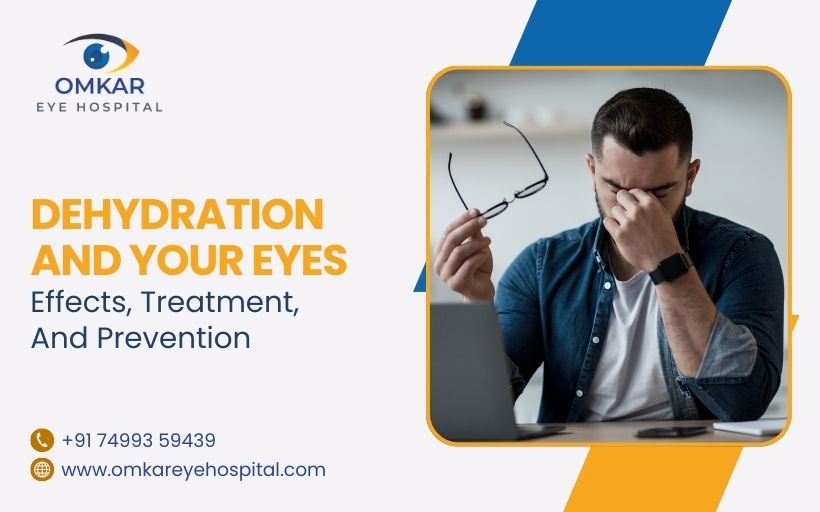Dehydration is a common health condition that can affect various parts of the body, including your eyes. When your body does not have enough water, it can lead to uncomfortable symptoms like dry, itchy, and irritated eyes. If not managed properly, dehydration can result in more serious eye health problems.
In this blog, we’ll explore how dehydration affects your eyes, the symptoms of dry eyes, treatment options, and preventive measures you can take to keep your eyes hydrated and healthy.
How Dehydration Affects the Eyes
For your eyes to function properly, there must be a balance of moisture. Water, oil, and mucus make up the tear film, which keeps the eyes lubricated. Your body's mucous membranes, especially the conjunctiva (the thin layer covering the surface of your eye), become dry when you're dehydrated. Dry eye symptoms and discomfort may result from this disruption of the tear film.
Dehydration can also cause the tear ducts to become less efficient, making it difficult for the eyes to maintain moisture. As a result, your eyes may feel dry, irritated, and sensitive. In severe cases, dehydration can make your eyes look sunken and tired. Moreover, it may increase the evaporation of your tears, further aggravating the problem.
According to an eye specialist, dry eyes can also cause redness, blurred vision, and even a grainy sensation in your eyes. Although dehydration is frequently linked to these symptoms, they can also be connected to other medical disorders.
As a result, it's hard to spot the symptoms early and take action to rehydrate.
Symptoms of Dry Eyes Due to Dehydration
Dehydration can lead to noticeable changes in your eyes. The most common symptoms include:
- Burning or stinging sensation: Your eyes may feel irritated, like something is in them.
- Redness: Blood vessels in the eyes can become more visible, leading to redness.
- Blurry vision: The lack of moisture on the surface of the eyes can cause vision to become blurry or inconsistent.
- Gritty feeling: It may feel like sand or grit in your eyes.
- Excessive tearing: Your body might produce more tears to compensate for dryness, leading to watery eyes.
- Increased sensitivity to light: You may experience discomfort if you are more sensitive to bright lights due to dry eyes.
People who wear contact lenses may experience additional discomfort, as their lenses can dry out or become harder to wear due to dehydration. If you are looking for an eye hospital in Chinchwad, look no further than the Omkar Eye Hospital.
Treatment for Dehydrated Eyes
The good news is that dehydration-induced dry eyes are typically treatable.
Increasing your water intake is the first step in replenishing your body's fluids. Most individuals are advised to drink 8 to 10 glasses of water each day, but if you live in a hot area or are really active, you may need more.
Here are some treatments that can help alleviate the discomfort of dry, dehydrated eyes:
- Artificial Tears: Over-the-counter eye drops can mimic natural tears and provide immediate relief by lubricating the eyes. Try different brands to see which one works best for you.
- Warm Compress: Placing a warm compress on your closed eyelids can help your eyes become more hydrated and relieve dryness.
- Prescription Eye Drops: Your eye doctor can suggest prescription drops, encouraging your eyes to produce more natural tears if artificial tears aren't enough to relieve discomfort.
- Punctal Plugs: Your doctor might suggest punctal plugs in certain situations. In order to keep your eyes wet for longer, these tiny devices are placed into your tear ducts to stop tears from dripping out too soon.
Preventing Dehydration and Dry Eyes
Preventing dehydration is the best way to avoid the discomfort of dry eyes. Here are some tips to help keep both your body and eyes hydrated:
- Drink Plenty of Water: Staying hydrated is key to preventing dry eyes. Always have a water bottle handy throughout the day to remind yourself to drink enough fluids.
- Use a Humidifier: Dry indoor air, particularly in hot or air-conditioned spaces, can make eye dryness worse. Adding moisture to the air and easing eye strain are two benefits of using a humidifier.
- Limit Exposure to Direct Airflow: Avoiding strong winds, hairdryers, or fans can prevent your eyes from drying out.
- Eat Eye-Healthy Foods: Consuming omega-3 fatty acids, which are present in walnuts, flaxseeds, and fatty fish, can help prevent dry eyes and enhance the condition of your tear film.
- Take Breaks from Long-term staring: at a computer or phone screen, as staring can lead to dry eyes and eye strain. Observe the 20-20-20 rule, which states that you should look at something 20 feet away for 20 seconds every 20 minutes.
- Protect Your Eyes from the Sun: Wearing sunglasses or protective eyewear outdoors can shield your eyes from the sun and wind, helping prevent dryness.
When to See an Eye Doctor
If you're still experiencing dry or irritated eyes after drinking more water and using some do-it-yourself remedies, it's must that you get in touch with an eye doctor. An underlying condition, like a chronic issue with your tear ducts or another eye health issue, could be the source of the dryness.
To be sure there are no additional problems, an eye specialist might conduct tests to measure the amount and quality of your tears.
If you are looking for an expert eye specialist to determine the underlying cause of your dry eye and provide more information on treatment options, look no further than Omkar Eye Hospital, one of the best eye hospitals in Chinchwad.


